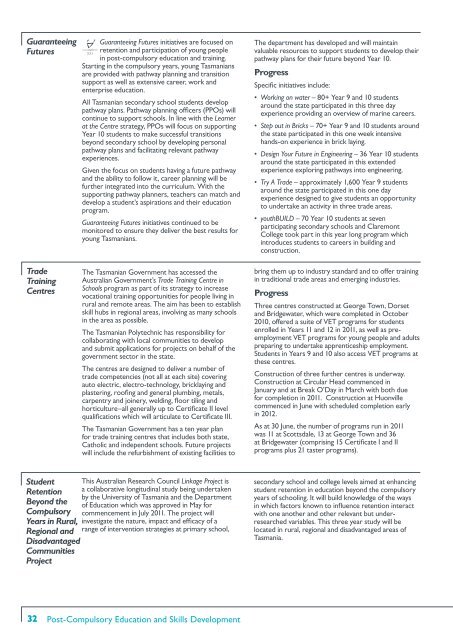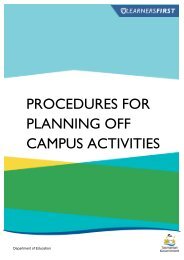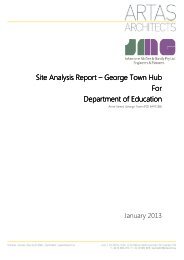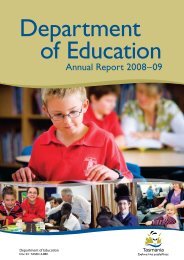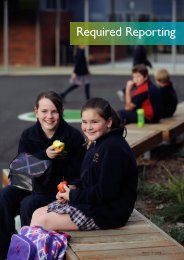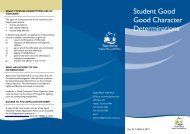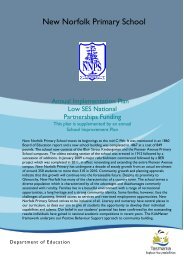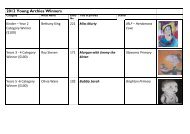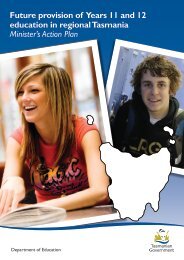Department of Education
DoE Annual Report 2010-2011 - Department of Education
DoE Annual Report 2010-2011 - Department of Education
- No tags were found...
You also want an ePaper? Increase the reach of your titles
YUMPU automatically turns print PDFs into web optimized ePapers that Google loves.
Guaranteeing<br />
Futures<br />
Trade<br />
Training<br />
Centres<br />
Guaranteeing Futures initiatives are focused on<br />
retention and participation <strong>of</strong> young people<br />
3.3.1<br />
in post-compulsory education and training.<br />
Starting in the compulsory years, young Tasmanians<br />
are provided with pathway planning and transition<br />
support as well as extensive career, work and<br />
enterprise education.<br />
All Tasmanian secondary school students develop<br />
pathway plans. Pathway planning <strong>of</strong>ficers (PPOs) will<br />
continue to support schools. In line with the Learner<br />
at the Centre strategy, PPOs will focus on supporting<br />
Year 10 students to make successful transitions<br />
beyond secondary school by developing personal<br />
pathway plans and facilitating relevant pathway<br />
experiences.<br />
Given the focus on students having a future pathway<br />
and the ability to follow it, career planning will be<br />
further integrated into the curriculum. With the<br />
supporting pathway planners, teachers can match and<br />
develop a student’s aspirations and their education<br />
program.<br />
Guaranteeing Futures initiatives continued to be<br />
monitored to ensure they deliver the best results for<br />
young Tasmanians.<br />
The Tasmanian Government has accessed the<br />
Australian Government’s Trade Training Centre in<br />
Schools program as part <strong>of</strong> its strategy to increase<br />
vocational training opportunities for people living in<br />
rural and remote areas. The aim has been to establish<br />
skill hubs in regional areas, involving as many schools<br />
in the area as possible.<br />
The Tasmanian Polytechnic has responsibility for<br />
collaborating with local communities to develop<br />
and submit applications for projects on behalf <strong>of</strong> the<br />
government sector in the state.<br />
The centres are designed to deliver a number <strong>of</strong><br />
trade competencies (not all at each site) covering<br />
auto electric, electro-technology, bricklaying and<br />
plastering, ro<strong>of</strong>ing and general plumbing, metals,<br />
carpentry and joinery, welding, floor tiling and<br />
horticulture–all generally up to Certificate II level<br />
qualifications which will articulate to Certificate III.<br />
The Tasmanian Government has a ten year plan<br />
for trade training centres that includes both state,<br />
Catholic and independent schools. Future projects<br />
will include the refurbishment <strong>of</strong> existing facilities to<br />
The department has developed and will maintain<br />
valuable resources to support students to develop their<br />
pathway plans for their future beyond Year 10.<br />
Progress<br />
Specific initiatives include:<br />
• Working on water – 80+ Year 9 and 10 students<br />
around the state participated in this three day<br />
experience providing an overview <strong>of</strong> marine careers.<br />
• Step out in Bricks – 70+ Year 9 and 10 students around<br />
the state participated in this one week intensive<br />
hands-on experience in brick laying.<br />
• Design Your Future in Engineering – 36 Year 10 students<br />
around the state participated in this extended<br />
experience exploring pathways into engineering.<br />
• Try A Trade – approximately 1,600 Year 9 students<br />
around the state participated in this one day<br />
experience designed to give students an opportunity<br />
to undertake an activity in three trade areas.<br />
• youthBUILD – 70 Year 10 students at seven<br />
participating secondary schools and Claremont<br />
College took part in this year long program which<br />
introduces students to careers in building and<br />
construction.<br />
bring them up to industry standard and to <strong>of</strong>fer training<br />
in traditional trade areas and emerging industries.<br />
Progress<br />
Three centres constructed at George Town, Dorset<br />
and Bridgewater, which were completed in October<br />
2010, <strong>of</strong>fered a suite <strong>of</strong> VET programs for students<br />
enrolled in Years 11 and 12 in 2011, as well as preemployment<br />
VET programs for young people and adults<br />
preparing to undertake apprenticeship employment.<br />
Students in Years 9 and 10 also access VET programs at<br />
these centres.<br />
Construction <strong>of</strong> three further centres is underway.<br />
Construction at Circular Head commenced in<br />
January and at Break O’Day in March with both due<br />
for completion in 2011. Construction at Huonville<br />
commenced in June with scheduled completion early<br />
in 2012.<br />
As at 30 June, the number <strong>of</strong> programs run in 2011<br />
was 11 at Scottsdale, 13 at George Town and 36<br />
at Bridgewater (comprising 15 Certificate I and II<br />
programs plus 21 taster programs).<br />
Student This Australian Research Council Linkage Project is<br />
Retention a collaborative longitudinal study being undertaken<br />
by the University <strong>of</strong> Tasmania and the <strong>Department</strong><br />
Beyond the <strong>of</strong> <strong>Education</strong> which was approved in May for<br />
Compulsory commencement in July 2011. The project will<br />
Years in Rural, investigate the nature, impact and efficacy <strong>of</strong> a<br />
Regional and range <strong>of</strong> intervention strategies at primary school,<br />
Disadvantaged<br />
Communities<br />
Project<br />
secondary school and college levels aimed at enhancing<br />
student retention in education beyond the compulsory<br />
years <strong>of</strong> schooling. It will build knowledge <strong>of</strong> the ways<br />
in which factors known to influence retention interact<br />
with one another and other relevant but underresearched<br />
variables. This three year study will be<br />
located in rural, regional and disadvantaged areas <strong>of</strong><br />
Tasmania.<br />
32<br />
Post-Compulsory <strong>Education</strong> and Skills Development


